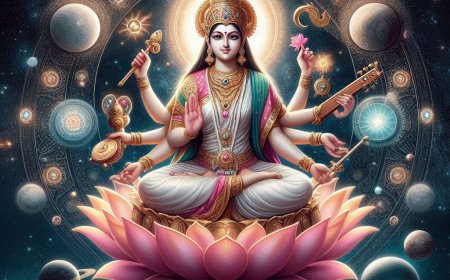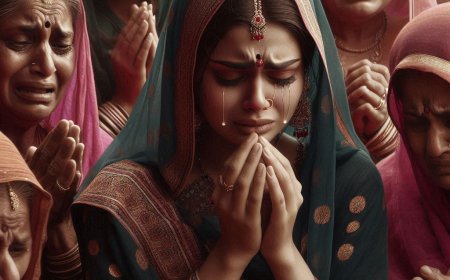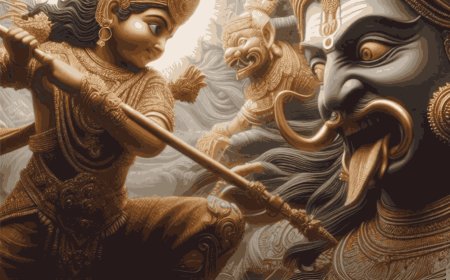The Legend of Goddess Shashthi: The Savior of King Priyavtara's Descendants
It tells the story of Goddess Shashthi, the goddess of fertility and protector of children, who descended to earth to revive the babies of King Priyavrata and Queen Malini who were born lifeless. As a condition, they must worship it on the sixth day of each month, making this worship a tradition to protect and bless children.
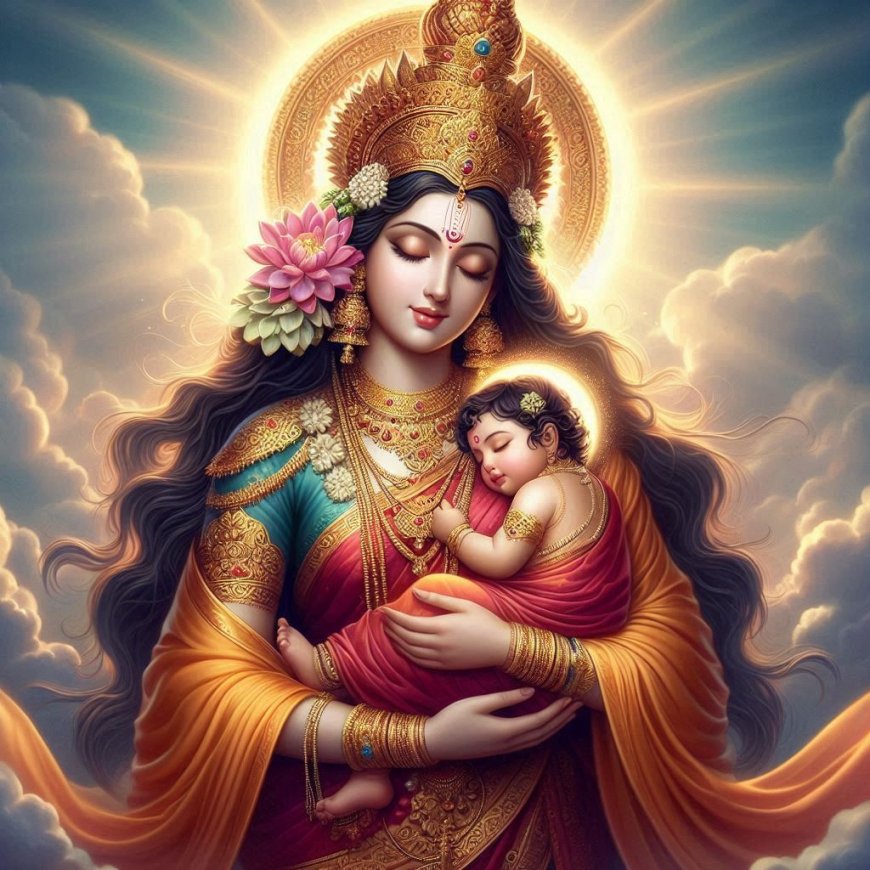
This was King Priyavrata, a wise and brave ruler who was the son of Svayambhuva Manu, the ancestor of mankind. Priyavrata was known all over the world for his courage on the battlefield, his kindness to his people, and his extensive wisdom in ruling his kingdom. However, despite all the wealth and honor he had, there was one thing that always troubled his heart: he had not been blessed with a child who would be the successor to the throne and continue his lineage.
His wife, Ratu Malini, was a woman of love and devotion. Together, they lived a life in harmony, ruling the kingdom justly and wisely. However, their desire to have a son remains unfulfilled. After years of praying and performing rituals, a sense of sadness and despair slowly began to creep into their hearts. Royal advisors, Brahmin scholars, and even ordinary people often reminded them of the importance of having a successor to maintain the stability and prosperity of the kingdom.
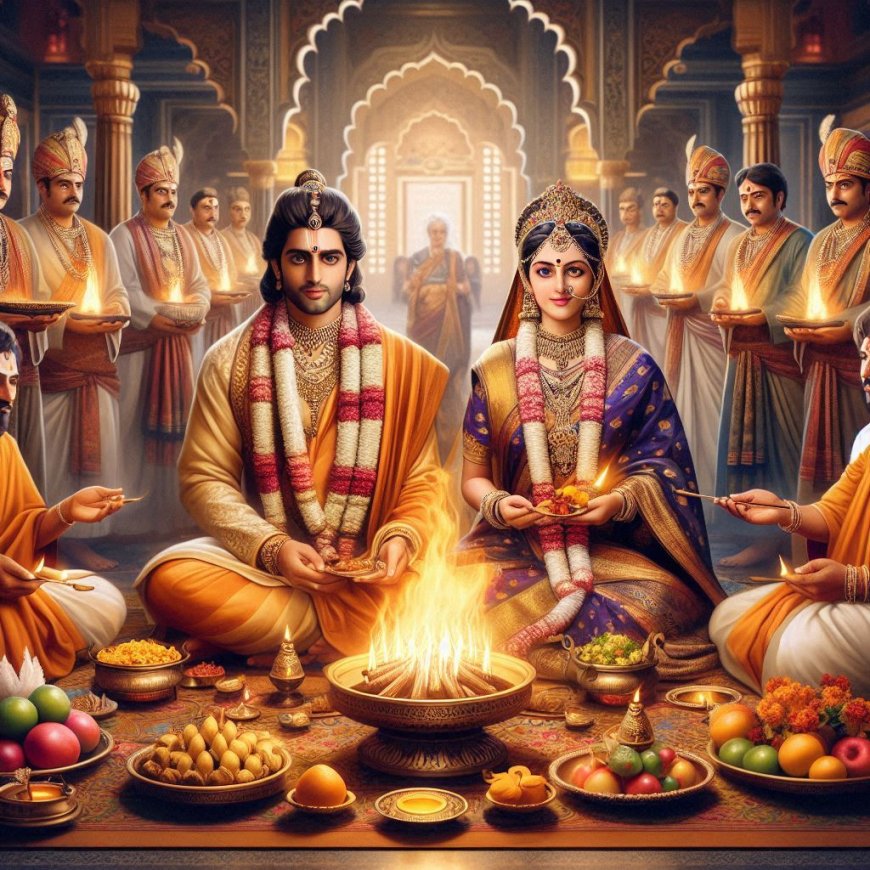 Illustration of King Priyavtara and Malini Carrying out Putrakamesti Yajna (Source: Private Collection)
Illustration of King Priyavtara and Malini Carrying out Putrakamesti Yajna (Source: Private Collection)
In desperation, Priyavrata and Malini decided to perform putrakamesti yajna, a fire sacrifice ritual intended for those who wanted to beg the gods to be blessed with offspring. They invited the most learned Brahmins in the entire kingdom to guide them in performing this sacred ceremony. With hearts full of hope and earnestness, Priyavrata and Malini performed the ritual with strict discipline and devotion, prostrating themselves before the sacred fire every day, begging the gods to bless them with a son.
The years passed. Every time the flame of yajna is lit, their hopeful prayers echo in the air, ascending to the sky, hoping for the mercy of the gods. For twelve long years, this royal couple waited with confidence, refraining from all worldly pleasures and living in pure devotion. They believed that their sacrifice would be heard by the gods and that they would eventually be blessed with a desirable son.
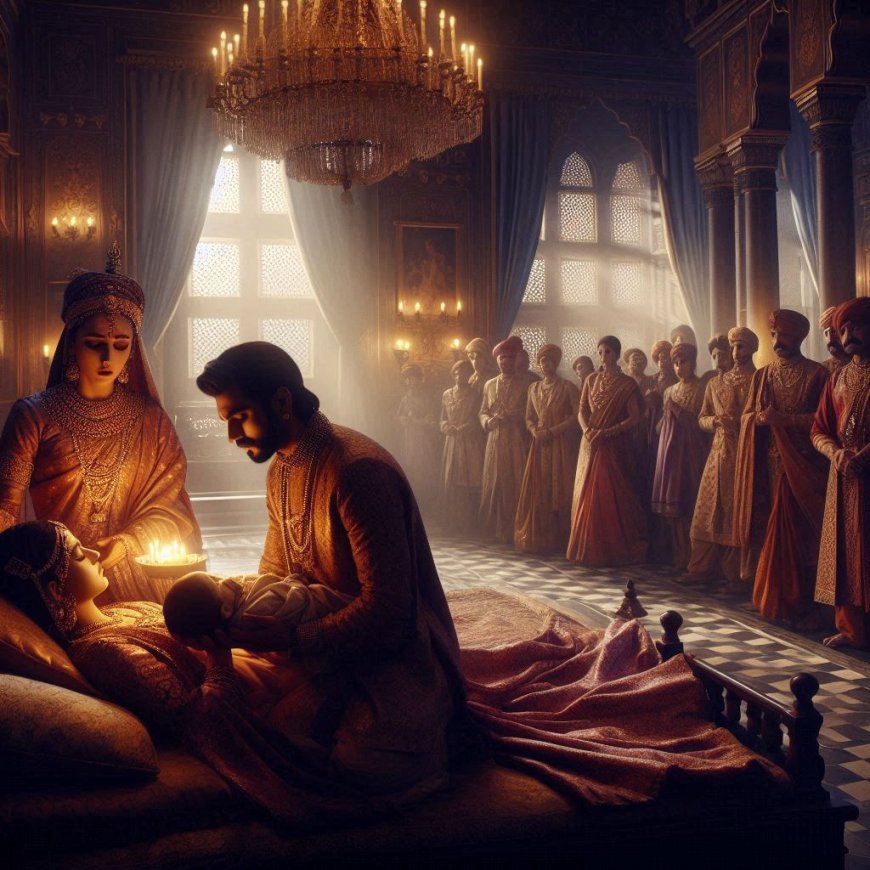 Illustration of the Birth of King Priyavtara's Child (Source: Private Collection)
Illustration of the Birth of King Priyavtara's Child (Source: Private Collection)
At the end of the 12th year, the happiness they had been waiting for seemed to finally come. Queen Malini is pregnant. The news of her pregnancy spread quickly throughout the kingdom, and the people welcomed the news with joy. The entire palace was filled with joy, and preparations to welcome the heir began. However, fate seemed to play tricks on them. When the time of birth came, Malini gave birth to a son, but the baby was born lifeless. When the palace healers announced that the baby had been stillborn, the atmosphere of joy turned into deep sadness.
Priyavrata and Malini were shattered, their dreams of a successor who would continue their bloodline were instantly destroyed. The king, who had previously been known to be strong and unshakable, felt a deep sense of despair, something he had never felt even in the fiercest of battles. Malini's sadness was also indescribable, she couldn't hold back her tears, her heart was broken at the sight of her baby's lifeless little body.
 Illustration of King Priyavtara Holding His Lifeless Son (Source: Private Collection)
Illustration of King Priyavtara Holding His Lifeless Son (Source: Private Collection)
Despite his heartbreak, Priyavrata is still determined to carry out his last duties as a father. She decided to cremate her son's body. With a heavy heart, he held the baby in his arms and walked towards the cremation site, accompanied by a quiet and sad atmosphere. The breeze that usually brings peace now feels heavy with the burden of sadness.
However, on the way to the cremation site, suddenly the sky above seemed to change. The clouds hanging in the sky parted, and from behind the gap in the sky, a divine ray emerged that radiated brightly. From that light, a glittering heavenly chariot descended from the sky, driven by such a graceful and luminous woman. The woman was dressed in shining white silk, adorned with jewels that reflected sunlight. He sat on the carriage with dazzling glory, and his aura exuded a deep peace and tranquility.
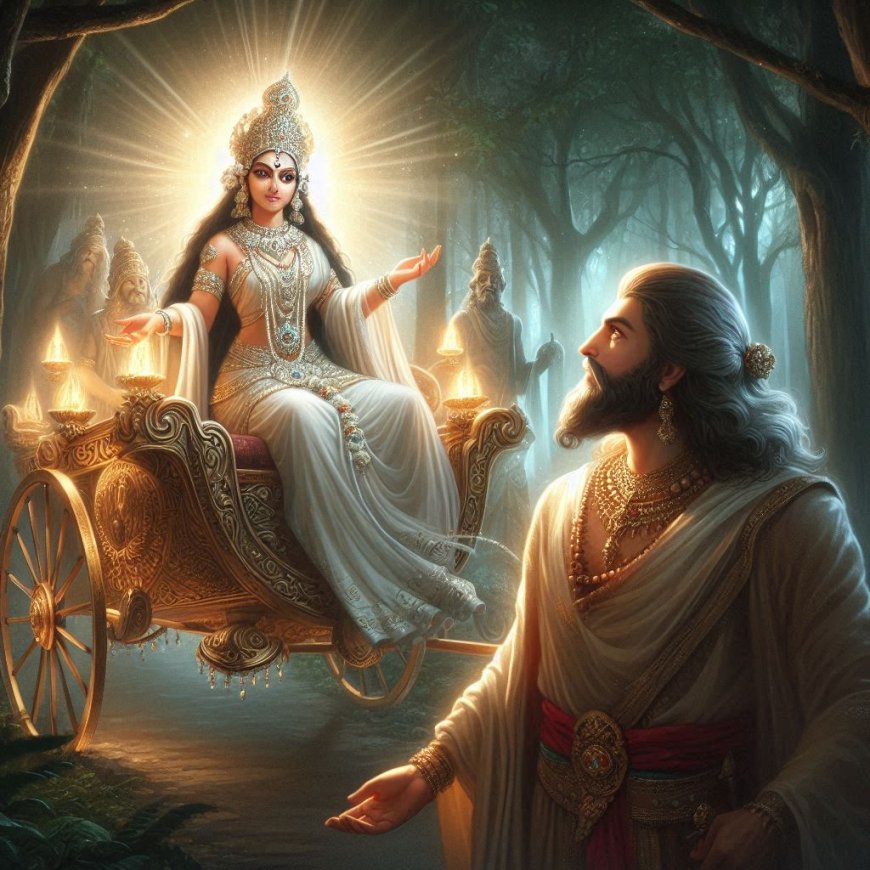 Illustration of King Priyavtara Meeting with Goddess Shashthi (Source: Private Collection)
Illustration of King Priyavtara Meeting with Goddess Shashthi (Source: Private Collection)
King Priyavrata paused, astonished by the sight. The woman got off her chariot and introduced herself as Devasena, the daughter of Brahma and the wife of Skanda, the god of war. However, she also manifested another divine aspect, namely as Shashthi, who was known as the goddess of fertility and the protector of children. Shashthi is one of the Matrikas, the divine mothers who have great power in protecting life and giving offspring to those who sincerely plead.
Shashthi, with a smile full of tenderness and compassion, approached Priyavrata. He looked at the lifeless baby and, affectionately, held out his hand. With the gentle touch of his divine hand, miracles happened. The baby, who was lifeless, began to breathe air. In a matter of seconds, his previously cold body became warm again, and the breath of life flowed within him again. The baby's eyes slowly opened, letting out the first cry that shook the king's heart.
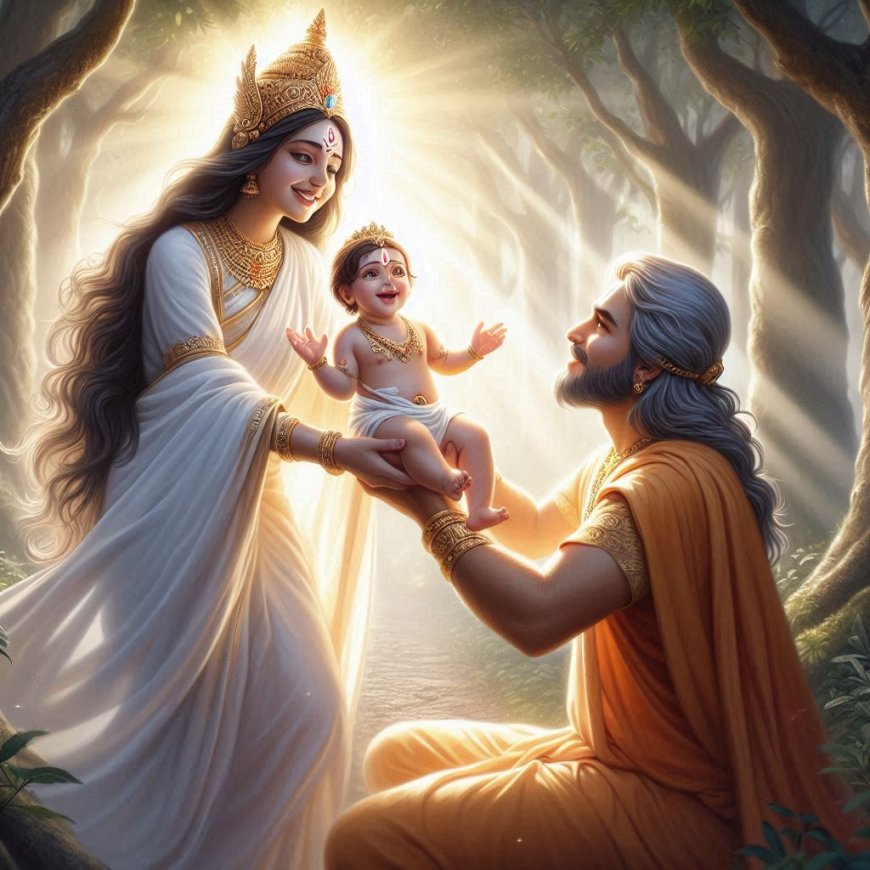 Illustration of the Child Coming Back to Life (Source: Private Collection)
Illustration of the Child Coming Back to Life (Source: Private Collection)
Priyavrata, who witnessed the miraculous moment, couldn't hold back her tears of happiness. He prostrated himself before Shashthi, expressing his infinite gratitude. She begged the goddess to return her son to him, promising that he would worship Shashthi in the three worlds, the earth, and the hereafter, as a form of respect and gratitude for the mercy that had been given to him.
With an understanding smile, Shashthi held the baby for the last time. He declared that this child would grow up to be a great king, a wise and just leader, known as Suvrata. The name has a deep meaning because Suvrata will live his life with virtue, follow the rules of dharma, and bring glory to his kingdom.
After giving the name and blessing, Shashthi returned the baby to Priyavrata. Before returning to his heavenly realm, Shashthi also gave a decree to King Priyavrata to honor him on the sixth day of each month, as well as on the special days after the birth of a child, i.e. the sixth and twenty-first days. He also stipulated that this goddess could be worshipped in various forms, both through the Shaligrama stone, a symbol of her divine presence, and through Purna Ghata, a pot of holy water placed under a banyan tree, a symbol of eternal life and prosperity.
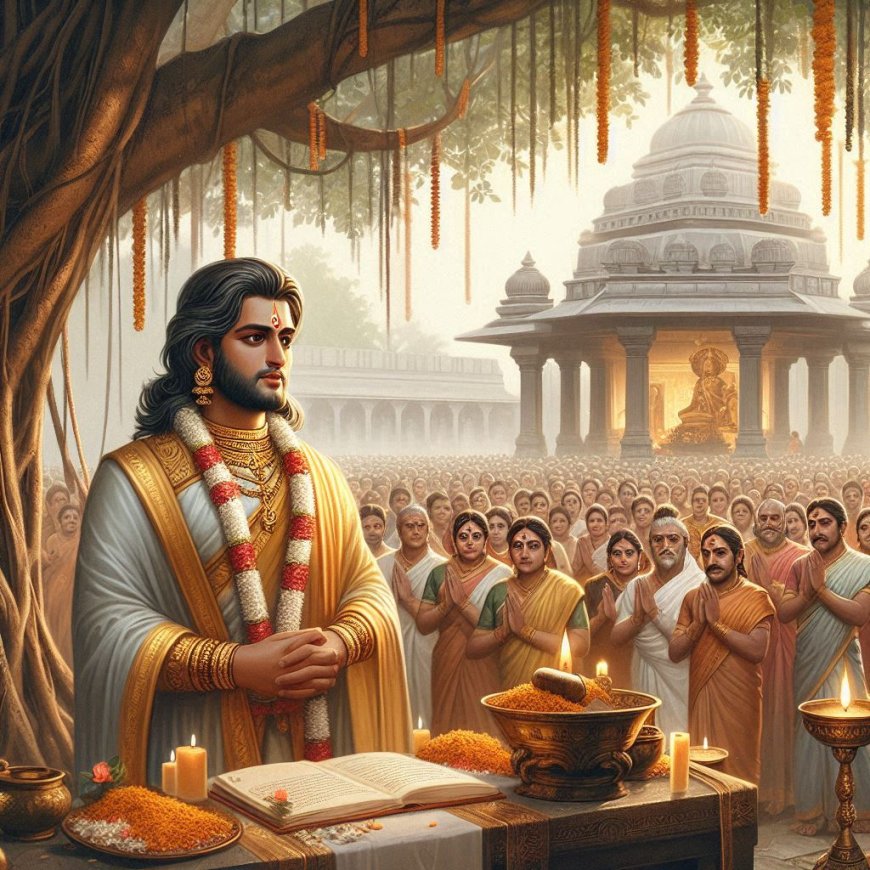 Illustration of King Priyavtara worshipping Goddess Shashthi (Source: Private Collection)
Illustration of King Priyavtara worshipping Goddess Shashthi (Source: Private Collection)
After Shashthi returned to heaven, King Priyavrata held a grand ceremony to celebrate the rebirth of his son, Suvrata. He spread the news of the miracle throughout his kingdom, and the people began to honor Shashthi as the protector of children and the giver of life. Worship of the Shashthi has become a tradition passed down from generation to generation, ensuring that divine grace continues to flow in their lives.
Suvrata, as foretold, grew up to be a wise king and a just leader, ruling with virtue and honor. Priyavrata and Malini, once haunted by despair, now live the rest of their lives in peace, grateful for the goddess's gift that has given them a son who will not only continue their lineage but also be the hope and pride of the entire kingdom.






































